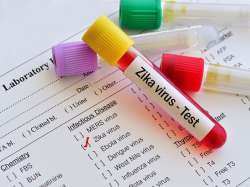Medical Breakthrough: New paper-based test can detect Zika virus in just 20 minutes!
Striking the difference between Zika and Dengue has been the biggest challenge in diagnosing the infection.

Scientists have been successful in developing a novel paper-based test which can diagnose Zika infection in just 20 minutes. It can also differentiate Zika from similar viruses like Dengue. Striking the difference between Zika and Dengue has been the biggest challenge in diagnosing the former. Many of the tests are based on antibodies that interact with a viral protein called NS1, which is also found in the bloodstream of infected patients.
Unfortunately, many other viruses from the same family, flaviviruses, have similar type of NS1 protein and can produce a false positive. Flaviviruses include West Nile virus and the virus that causes yellow fever as well as Dengue virus.
"It's important to have a single test that can differentiate between the four serotypes of Dengue and Zika because they co-circulate. They're spread by the same mosquito," said Kimberly Hamad-Schifferli, Associate Professor at the University of Massachusetts at Boston.
For the study, detailed in the journal Science Translational Medicine, the team exposed mice to Zika and Dengue viruses and then screened the resulting antibodies in pairs against every flavivirus' version of the NS1 protein. This allowed them to identify pairs of antibodies that react only with one version of NS1.
The researchers used these pairs to create five separate tests, one for each virus. They coated strips of paper with one antibody from each pair while the second antibody was attached to gold nanoparticles.
After adding the blood sample to the solution of these nanoparticles, the paper strip is dipped into the solution. If the target NS1 is present in the sample, it clings to the antibodies on the strip as well as the nanoparticle-bound antibodies and a coloured spot is seen on the strip in 20 minutes. This test requires 5 strips per test for each virus. Researchers are working on an improvised version that would test for all five with one strip.
(With IANS Inputs)